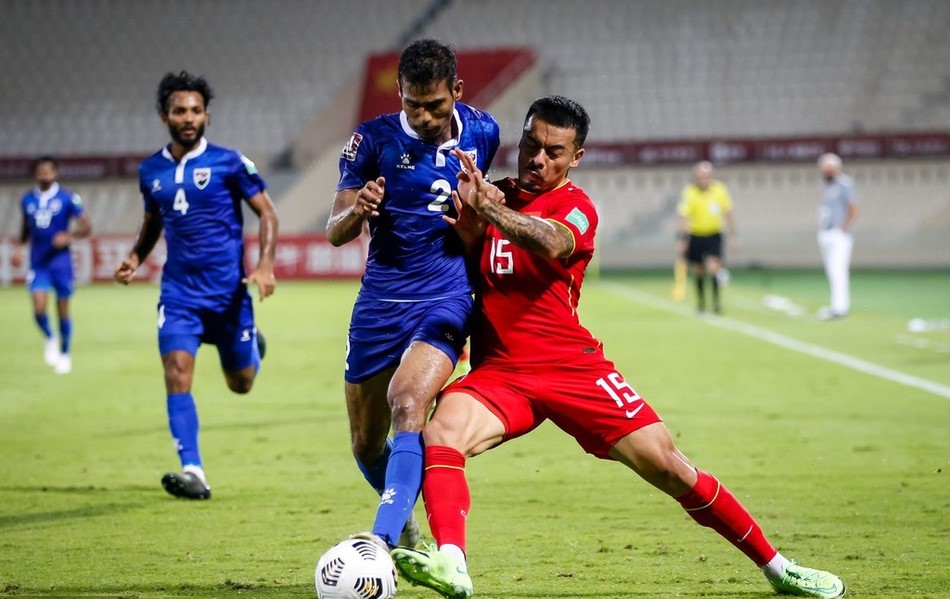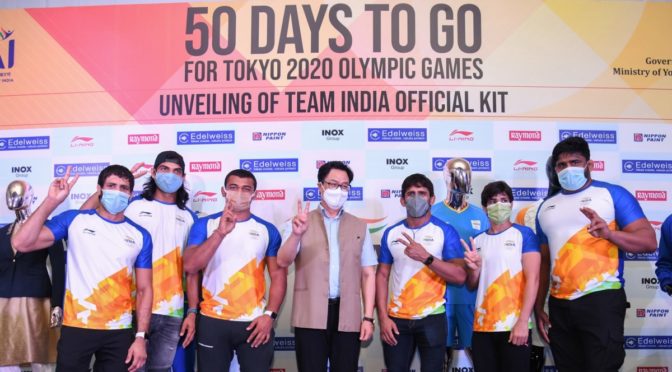In this week’s look at all the latest news in the build-up to the Olympics and elsewhere:
- Indian Olympic Association scraps Li-Ning kit deal
- China on the verge of progressing in FIFA World Cup qualifying
- The IOC provides an update on its plans for Beijing
- 22nd death in Gansu ultramarathon disaster as official commits suicide
- The latest boycott threats from around the world
- All the other features and stories of interest
Indian Olympic Association Scraps Li-Ning Kit Deal
Less than a week ago, the Indian Olympic Association (IOA) held a press conference unveiling its new kit for the Tokyo Olympics, which was designed by Chinese sportswear manufacturer Li-Ning. But just days later in an embarrassing U-turn, the Indian Olympic Association abandoned the kit, saying it would instead wear unbranded uniforms in Japan.
The Olympic uniforms were launched to coincide with the 50 days to go milestone, with Indian Sports Minister Kiren Rijiju saying, “I urge every Indian to cheer for the Indian squad.” But it appears that many Indians then said they would refuse to do so if the squad was wearing Chinese-made apparel, with thousands taking to Twitter and other social media platforms to register their discontent.
Indian displeasure towards China stems from the fact that the two countries clashed a year ago over their disputed border region, with 20 Indian soldiers and an unknown number of Chinese casualties reportedly killed in skirmishes. As a result, there have been public calls for Chinese companies to be boycotted in India, and there has been plenty of bad blood between the two sides since. In the end, the Sports Ministry then reportedly advised the IOA not to include a Chinese sponsor for the Olympics and the deal was duly scrapped.
However, this was all a little predictable, with the IOA already saying last year that it would review its deal with Li-Ning. But given the passionate reaction in the country over the last 12 months, it really should have come as no surprise that Indians weren’t happy about such a high-profile sponsorship. It looks like there might be an opportunity for focus group companies in India to avoid this sort of thing in the future…
China On Verge of Progressing to Next Round of World Cup Qualifying
China has taken a huge step in the last week towards moving into the third round of Asian Football Confederation (AFC) qualifying to see which teams from the region will play at next year’s FIFA World Cup in Qatar. After a win against Guam (7-0) and a subsequent switch of location to the UAE which saw further victories against the Philippines (2-0) and the Maldives (5-0), China now needs only to avoid defeat in next Tuesday’s game against Syria to guarantee qualification as one of the best second-placed teams. Even if China loses to Syria, at least four other unlikely results would have to go against China to stop them from progressing.
However, things will get much, much tougher in the third round, which is scheduled to start in September. 12 teams will be divided into two groups of six, with only the top two in each one qualifying for the World Cup, while the two third-placed teams will face off to see who will have a final chance in the intercontinental playoffs. With South Korea, Japan and Australia perennial favorites to claim one of the prized spots, and another four teams currently ranked higher than China all likely to be in the third round as well, the chances of China qualifying for only its second men’s World Cup in history remain slight.

However, there has been a small sign of progress in the last week. As the tweet below shows, Chinese players have been banned from displaying their tattoos while on national team duty – presumably for fear of offending the sensitive eyes of the leadership, because there is no other logical explanation, as I wrote at the time. But with temperatures in the UAE reaching 45C – and still at 41C around sunset and 35C for evening kick-off times – team bosses have allowed players to remove the bandages and sleeves they’ve had to wear for the past three years. A small concession, to be sure, but at least an admission that covering up tattoos doesn’t actually help win football matches. Who would have thought?
IOC Gives Update on Beijing Plans
The IOC has been singing Beijing’s praises this week, with Executive Director Christophe Dubi saying the city is “an amazing destination for Winter Games” during the press conference that followed the IOC’s Executive Board meeting. He also reiterated that an additional 10 international test events and three international training weeks will be held from September to December to make up for the previously canceled test events, and said that Beijing 2022 is planning a number of events and campaigns, including the Beijing Winter Sports Festival, to build excitement for the capital’s residents and visitors.
With regards to arrangements for Beijing, Dubi said that Tokyo 2020 would be closely followed as a guide to see what could be implemented in China, saying “we want to use the Tokyo Games to gain as much information as possible when it comes to people coming from outside, and testing the measures in Tokyo will allow us to finalize the policies when it comes to Beijing.”
22nd Death in Ultramarathon Disaster as Official Falls from High-Rise
I wrote two weeks ago about the tragic ultramarathon race in Gansu province, in which 21 competitors – including five of the leading pack of six – died due to a combination of extreme weather and unforgivably poor organization and rescue preparedness from the race organizers. Unfortunately, one more person has now been added to the death toll – likely just as avoidable as the previous 21.
Officials said this week that 31 people would be held responsible and that the leader of the county in which the ultramarathon was held had died in a fall from a high-rise building. That man, Li Zuobi, was primarily held responsible for the race’s high death toll. From The Wall Street Journal:
“Li Zuobi, the Communist Party secretary of Jingtai County in Gansu province, died after falling from his high-rise apartment building in the city of Baiyin on Wednesday morning, according to people familiar with the matter. The 56-year-old official’s death came after he was visited by Communist Party discipline officials earlier that day, the people said. A state-run magazine, Western China Development, in a social media post Thursday cited local officials in reporting that Mr. Li’s death had been a suicide.”
While the cause of death has yet to be officially confirmed, it’s not unusual to hear of similar stories about officials reported to be in serious trouble or under investigation for corruption. The alternative – lengthy detention in the depths of the Chinese system with little legal recourse – is often viewed as worse both for the individual and their family.
Boycott Watch
11 parliaments have now either debated or passed motions criticizing China and laying out initiatives to oppose the 2022 Beijing Olympics in some way. In addition to the European parliament, these have come from the US, Canada, the UK, Germany, Italy, the Czech Republic, Switzerland, Sweden, Lithuania and Denmark.
All of this fits in with Washington’s public stance of wanting to consult with allies on a shared approach to the Olympics. Some of the more extreme approaches have called on the Games to be boycotted or even moved to another location, but, as I’ve written before, it remains unlikely that athlete delegations will skip China entirely. However, it also looks increasingly likely that whatever measures are taken – ranging from statements issued to dignitaries skipping the Opening and Closing Ceremonies – will be coordinated between a number of countries. Secretary of State Antony Blinken told a congressional hearing in Washington this week that the US was ideally looking “to establish a common approach” on the Games, adding that there would be “more on that in the weeks to come.”
China’s response was swift and predictable, with foreign ministry spokesman Zhao Lijian saying, “Politicizing sports is against the spirit of the Olympic Charter, and harms the interests of athletes as well as the international Olympic cause. Relevant parties should immediately stop their use of the Olympic Games to engage in political manipulation.”
See also: Politicians push Beijing Winter Olympics ‘diplomatic boycott’ across 11 Western countries [SCMP]
Other Stories and Links
- Chinese ace Wang Qiang to skip Wimbledon to focus on Olympic Games preparation [SCMP]
- Remembering the 2008 Beijing Olympics [Nikkei Asian Review]
- Winter Olympics education reaches deep into Beijing’s schools [Xinhua]
- Vermont National Guard Biathletes Eye 2022 Olympic Games in Beijing [DVIDS]
To keep up-to-date with all the latest news from China Sports Insider, please click on the “SUBSCRIBE” button in the top right corner of this page (or see below on mobile version). Follow along on Twitter for regular updates.


